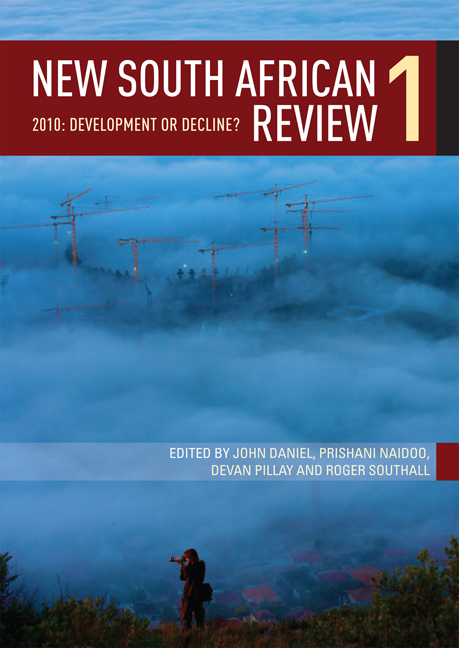Book contents
- Frontmatter
- Contents
- Preface
- Introduction South Africa 2010: From short-term success to long-term decline?
- PART 1 ECONOMY, ECOLOGY AND SUSTAINABILITY
- PART 2 STATE, POLITICS AND POLICY
- INTRODUCTION The politics and challenges of delivery
- CHAPTER 6 The African National Congress under Jacob Zuma
- CHAPTER 7 Indigent management: A strategic response to the struggles of the poor in post-apartheid South Africa
- CHAPTER 8 Fear, enervation and the systematisation of disorder: Challenges to reforming the Department of Home Affairs
- CHAPTER 9 The mobile nation: How migration continues to shape South Africa
- CHAPTER 10 South African female peacekeepers: An exploration of their experiences in the Democratic Republic of Congo
- PART 3 EDUCATION, HEALTH AND LAND
- PART 4 Doreen Atkinson
- Contributors
- Index
CHAPTER 8 - Fear, enervation and the systematisation of disorder: Challenges to reforming the Department of Home Affairs
from PART 2 - STATE, POLITICS AND POLICY
Published online by Cambridge University Press: 21 April 2018
- Frontmatter
- Contents
- Preface
- Introduction South Africa 2010: From short-term success to long-term decline?
- PART 1 ECONOMY, ECOLOGY AND SUSTAINABILITY
- PART 2 STATE, POLITICS AND POLICY
- INTRODUCTION The politics and challenges of delivery
- CHAPTER 6 The African National Congress under Jacob Zuma
- CHAPTER 7 Indigent management: A strategic response to the struggles of the poor in post-apartheid South Africa
- CHAPTER 8 Fear, enervation and the systematisation of disorder: Challenges to reforming the Department of Home Affairs
- CHAPTER 9 The mobile nation: How migration continues to shape South Africa
- CHAPTER 10 South African female peacekeepers: An exploration of their experiences in the Democratic Republic of Congo
- PART 3 EDUCATION, HEALTH AND LAND
- PART 4 Doreen Atkinson
- Contributors
- Index
Summary
The reputation of the Department of Home Affairs (DoHA) leaves much to be desired. For many South Africans, it represents ‘government bureaucracy’ at its worst, and use of the term ‘horror affairs’ (coined by the Daily Sun newspaper) has become widespread. Given the shocking stories that emerge in the media, this is understandable: in 2003, a South African citizen whose identity document had been stolen was picked up in Hillbrow as a suspected ‘illegal alien’ and deported to Zimbabwe (Pretoria News 14 November 2006). In 2006, a man took a DoHA official hostage for six hours at a Johannesburg office, demanding that he be issued his national identity document (ID), for which he had been waiting some two and a half years (Mail & Guardian 9 July 2008). And in 2009, a twenty-two year-old Durban man who was unemployed for want of his national identity document hanged himself after a Home Affairs official tore up his ID application (The Citizen 1–3 September 2009). These cases, though extreme, point to a general atmosphere of disorder and inefficiency at the DoHA. Having spoken with hundreds of people about the Department of Home Affairs since I began researching it in early 2008, I have found that nearly everyone has a personal story of the DoHA's corruption, its inefficiency and/or its disarray, to relate.
To be fair, the Department's notoriety stems in part from the fact that it provides so many important or high-profile services: deporting undocumented non-nationals; processing claims for asylum; and issuing some of the most vital official documents including birth, marriage, and death certificates, national identity documents, passports and work and visitor permits. As officials at various levels in the Department hierarchy told me, the DoHA is with you from the day you are born until the day you die. Additionally, Home Affairs is under heavy scrutiny because, unlike other South African government bureaucracies such as, for example, Agriculture and Land Affairs or Social Services, the DoHA serves people from every walk of life – the wealthy businesswoman in Sandton, the Somali spaza shop owner in Durban, the newborn baby in Mafikeng and the farmer in the Free State are all obliged to make an occasional trip to the DoHA office nearest to them.
- Type
- Chapter
- Information
- New South African Review2010: Development or Decline?, pp. 205 - 217Publisher: Wits University PressPrint publication year: 2010



